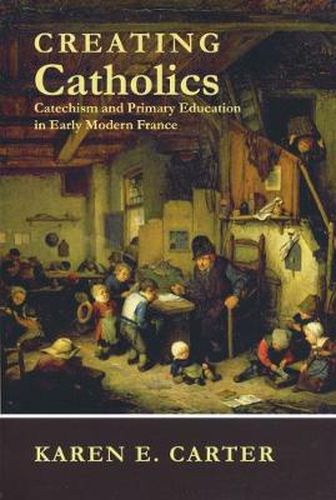Readings Newsletter
Become a Readings Member to make your shopping experience even easier.
Sign in or sign up for free!
You’re not far away from qualifying for FREE standard shipping within Australia
You’ve qualified for FREE standard shipping within Australia
The cart is loading…






The religious education of children represents a critical component of the Catholic Reformation that has often been overlooked by historians of early modern Europe. In Creating Catholics: Catechism and Primary Education in Early Modern France, Karen E. Carter examines rural schooling in France in the seventeenth and eighteenth centuries-the period when community-supported primary education began-and brings to light a significant element of the early modern period.
Carter scrutinizes Catholic religious education in rural parishes in France through its two leading forms: the explosion of Catholic catechisms for children and their use in village schools. She concentrates on educational opportunities for rural peasants in three French dioceses: Auxerre (in Burgundy) and Chalons-sur-Marne and Reims (in Champagne). Carter argues that the study of catechism in village schools was an integral part of a comprehensive program, implemented by both clerical and lay leaders, for the religious, ethical, and moral education of children. Her research demonstrates that the clergy and a majority of the lay population believed in the efficacy of this program; for this reason, parish priests taught catechism in their parishes on a weekly basis, and small village communities established and paid for a surprisingly large number of local schools so that their sons and daughters could receive an education both in basic literacy skills and, through memorization of catechism, in Catholic faith and practice.
$9.00 standard shipping within Australia
FREE standard shipping within Australia for orders over $100.00
Express & International shipping calculated at checkout
The religious education of children represents a critical component of the Catholic Reformation that has often been overlooked by historians of early modern Europe. In Creating Catholics: Catechism and Primary Education in Early Modern France, Karen E. Carter examines rural schooling in France in the seventeenth and eighteenth centuries-the period when community-supported primary education began-and brings to light a significant element of the early modern period.
Carter scrutinizes Catholic religious education in rural parishes in France through its two leading forms: the explosion of Catholic catechisms for children and their use in village schools. She concentrates on educational opportunities for rural peasants in three French dioceses: Auxerre (in Burgundy) and Chalons-sur-Marne and Reims (in Champagne). Carter argues that the study of catechism in village schools was an integral part of a comprehensive program, implemented by both clerical and lay leaders, for the religious, ethical, and moral education of children. Her research demonstrates that the clergy and a majority of the lay population believed in the efficacy of this program; for this reason, parish priests taught catechism in their parishes on a weekly basis, and small village communities established and paid for a surprisingly large number of local schools so that their sons and daughters could receive an education both in basic literacy skills and, through memorization of catechism, in Catholic faith and practice.